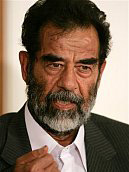|
 |
| In this file image cleared by the US military,
Saddam Hussein appears in a courtroom at Camp Victory, a former
Saddam palace on the outskirts of Baghdad, July 1,
2004.(AP) |
Saddam Hussein will go on trial within two months
on charges of crimes against humanity, with prosecutors focusing on 12
"thoroughly documented" counts, including the gassing
of thousands of Kurds in northern Iraq, a
spokesman for Iraq's prime minister said Sunday.
Saddam's trial could prove to be highly divisive in an already
turbulent Iraq that shows signs of deepening sectarian divisions.
Reflecting these tensions, the Shiite-led Iraqi government acknowledged
Sunday that its forces may have targeted innocent Sunni Muslims in a drive
to crush the insurgency in southwestern Baghdad and its suburbs.
Starting the court proceedings against Saddam in two months would
overlap with the writing of the constitution.
"There should be no objection that a trial should take place within
that time," said Laith Kuba, a spokesman for Iraqi Prime Minister Ibrahim
al-Jaafari. "It is the government's view that the trial of Saddam should
take place as soon as possible."
Kuba said the attack with chemical weapons on the Kurdish town of
Halabja was one of the charges, but did not elaborate on the other 11. An
estimated 5,000 people were killed in Halabja and 10,000 others were hurt
in the gassing on March 16, 1988.
In recent days, Sunni Muslim organizations have
charged that many innocent Iraqis have been arrested in the drive to crush
the insurgency and most were Sunnis, the minority that dominated the
country during Saddam's rule and are believed to form the insurgency's
backbone
.
"There is an improvement in security and in the performance of the
security forces, but members of the army and police do cause mistakes,
which do happen," Kuba said.
There were also some claims that "soldiers took advantage and helped
themselves to cash and other items. One doesn't rule it out. I think the
army needs more disciplinary measures in these cases," Kuba said.
Regardless of the complaints and the acknowledged mistakes, the
crackdown dubbed Operation Lighting entered its second week Sunday and
appeared to have somewhat blunted insurgent attacks in the capital.
(Agencies) | 